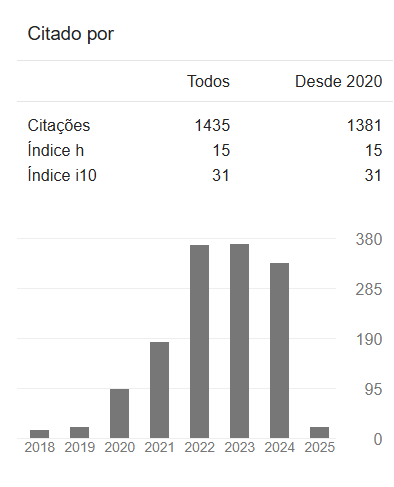INTERDISCIPLINARITY AND ENVIRONMENTAL EDUCATION: A SUSTAINABLE DIALOGUE
DOI:
10.23926/RPD.2526-2149.2020.v5.n3.p1733-1746.id830Keywords:
Ecological Awareness, Environment, SustainabilityAbstract
The objective of this work is, by means of a theoretical approach, to bring to discussion the importance of Environmental Education under an interdisciplinary approach in educational contexts, its contribution to the sensitization of the human being as part of the ecological system and, still, to deal with the theme in a systemic way, from the perspective of the set of Sustainable Development Goals - Agenda 2030. The method used in this research was inductive, because from the relationship between particular basic statements, it allows to reach a general conclusion. The environmental dimension is configured as an issue that concerns a set of actors from the educational, pedagogical and substantial universe, which enhances the involvement of the various knowledge systems, necessary to promote the debate and the search for results, constituting, therefore, the Environmental Education as a transforming action and an instrument for sustainable development.
Downloads
Metrics
References
ASSIS, Ana Flávia Silva de; MANSILLA, Débora Eriléia Pedrotti. Educação ambiental e ensino de ciências: contribuições de uma aula de campo. Revista Prática Docente, v. 3, n. 2, p. 539-556, jul./dez. 2018. Disponível em: http://periodicos.cfs.ifmt.edu.br/periodicos/index.php/rpd/article/view/235/95. Acesso em: 11 mar. 2020. DOI: https://doi.org/10.23926/RPD.2526-2149.2018.v3.n2.p539-556.id235
BIASOLI, Semíramis; SORRENTINO, Marcos. Dimensões das políticas públicas de educação ambiental: a necessária inclusão da política do cotidiano. Ambiente e Sociedade, v. 21, n. 118, jul. 2018. Disponível em: http://www.scielo.br/scielo. Acesso em: 9 mar. 2020.
BRASIL, Constituição Federal de 1988. República Federativa do Brasil. Brasília: Senado Federal, Centro Gráfico, 1988.
BRASIL. Lei Federal nº 9.795, de 27 de abril de 1999. Dispõe sobre a educação ambiental, institui a Política Nacional de Educação Ambiental e dá outras providências. Disponível em: http://www.planalto.gov.br/ccivil_03/leis/l9795.htm.
BRASIL. Lei Federal nº 6.938, de 31 de agosto de 1981. Dispõe sobre a Política Nacional do Meio Ambiente. Disponível em: http://www.planalto.gov.br/ccivil_03/leis/l6938.htm#:~:text=LEI%20N%C2%BA%206.938%2C%20DE%2031%20DE%20AGOSTO%20DE%201981&text=Disp%C3%B5e%20sobre%20a%20Pol%C3%ADtica%20Nacional,aplica%C3%A7%C3%A3o%2C%20e%20d%C3%A1%20outras%20provid%C3%AAncias.
BRASIL. Ministério da Educação e do Desporto. Secretaria de Educação Fundamental. Parâmetros curriculares nacionais: introdução dos temas transversais e ética. Meio Ambiente e saúde. Brasília: MEC/SEF, 1997.
CAPRA, Fritjof. A teia da vida: uma nova compreensão científica dos sistemas vivos. Tradução Newton Roberval Eichemberg (Tradução de The web of life). São Paulo: Cultrix, 1996.
DEMOLY, Karla Rosane do Amaral; SANTOS, Joceilma Sales Biziu dos. Aprendizagem, educação ambiental e escola: modos de en-agir na experiência de estudantes e professores. Ambiente e Sociedade, v. 21, n. 118, jul. 2018. Disponível em: http://www.scielo.br/scielo. Acesso em: 26 fev. 2020.
DIAS, Genebaldo F. Educação ambiental: princípios e práticas. São Paulo: Goiás, 1992.
GADOTTI, Moacir. Pedagogia da terra: Ecopedagogia e educação sustentável. In: GADOTTI, Moacir. Paulo Freire y la agenda de la educación latinoamericana en el siglo XXI. Buenos Aires: CLACSO, Consejo Latinoamericano de Ciencias Sociales Editorial, 2001. Disponível em: http://biblioteca.clacso.edu.ar/clacso/gt/20101010031842/4gadotti.pdf.
GIRON, Heloisa; FERRARO, José, Luis Schfino. Uma proposta de diálogo entre Paulo Freire e a educação ambiental crítica. Rev. Eletrônica Mestrado Educ. Ambiental, Rio Grande, Ed. Especial EDEA, n. 1, p. 239-252, 2018. DOI: https://doi.org/10.14295/remea.v0i1.8576
GOMES, Róger Walteman. Por uma educação ambiental crítica/emancipatória: dialogando com alunos de uma escola privada no Município de Rio Grande/RS. Ciência e Natura – Revista do Centro de Ciências Naturais e Exatas, UFSM, Santa Maria, v. 36, n. 3, p. 430-440, set.-dez. 2014. DOI: https://doi.org/10.5902/2179460X13171
LEFF, Enrique. Saber ambiental: sustentabilidade, racionalidade, complexidade, poder. Petrópolis, RJ: Vozes, 2015.
LÜCK, Heloísa. Pedagogia interdisciplinar: fundamentos teórico-metodológicos. 11. ed. Petrópolis, RJ: Vozes, 2003.
MELO, Lucélia Granja. A importância da Educação Ambiental no ambiente escolar. In: EcoDebate. ISSN 2446- 9394, 14/03/2017. Disponível em: https://www.ecodebate.com.br/2017/03/14/ importancia-da-educacao-ambiental-noambiente-escolar-artigo-de-lucelia-granja-de-mello.
NAÇÕES UNIDAS. Transformando nosso mundo: A Agenda 2030 para o desenvolvimento Sustentável. ONU/Brasil – 2015. Disponível em: https://nacoesunidas.org/pos2015/. Acesso em: 30 mar. 2020.
NASCIMENTO, Priscila Thais Bezerra do. et al. Educação Ambiental e projetos interdisciplinares: um olhar sob os anos finais do ensino fundamental. Revista Brasileira de Meio Ambiente, v. 2, n. 1, p. 18-26, 2018.
NASCIMENTO, Waddle Almeida. Educação ambiental e ressignificação do espaço escolar: estudo de caso em uma escola de ensino técnico do estado do Pará. Revista Prática Docente, v. 5, n. 1, p. 156-171, jan./abr. 2020. Disponível em: http://periodicos.cfs.ifmt.edu.br/periodicos/index.php/rpd/article/view/534/264. Acesso em: 4 maio 2020.
REIGOTA, Marcos. O que é Educação Ambiental. São Paulo: Brasiliense, 1994.
SÉGUIN, Elida. Direito Ambiental: nossa casa planetária. Rio de Janeiro: Forense, 2002.
SILVA, Danise Guimarães. A importância da educação ambiental para a sustentabilidade. Faculdade Estadual de Educação, Ciências e Letras de Paranavaí. FAFIPA. 2012.
SIRVINSKAS, Luiz Paulo. Manual de Direito Ambiental. 3. ed. São Paulo: Saraiva, 2005.
TEIXEIRA, Orci Paulino Bretanha. O direito ao meio ambiente ecologicamente equilibrado como direito fundamental. Porto Alegre: Livraria do Advogado, 2006.
Downloads
Published
How to Cite
Issue
Section
License
Copyright (c) 2023 A Revista Prática Docente tem o direito de primeira publicação

This work is licensed under a Creative Commons Attribution-NonCommercial 4.0 International License.
Authors who publish in this journal agree to the following terms:
- Authors retain the copyright and grant the journal the right of first publication, with the paper simultaneously licensed under the Licença Creative Commons Attribution allows the sharing of the work with acknowledgment of authorship and initial publication in this journal.
- Authors are authorized to take additional contracts separately, for non-exclusive distribution of the version of the work published in this journal (e.g. publish in institutional repository or as a book chapter), with acknowledgment of authorship and initial publication in this journal.











